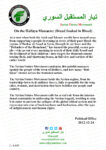ArticlesPolitical officeResearch and Studies Department
Syrian Refugees in Neighboring Countries: Problems and Solutions

According to recent statistics, the number of Syrian refugees in Lebanon, Jordan, and Turkey is as follows:
- Lebanon: There are at least two million Syrian refugees, including those registered with the UN Refugee Agency and those who have entered legally or surreptitiously.
- Jordan: The number of Syrian refugees is estimated at around 730,000 registered refugees.
- Turkey: Hosts about 3.6 million registered Syrian refugees.
These figures, reflecting the current situation, show that Syrian refugees face numerous challenges in host countries like Lebanon, Jordan, and Turkey, including:
- In Lebanon:
- Economic crisis: Around 90% of Syrian refugees live in extreme poverty, according to UN reports.
- Residency: Refugees struggle to find safe and decent shelter.
- Education and employment: Some rely on negative coping strategies like begging or stopping sending their children to school.
- Economic burden: The cost of Syrian displacement on Lebanon exceeds $700 million annually, according to government statistics.
- Political and social crises: Serious demographic impacts and security repercussions.
- Recognition of safe zones: Calls to resolve the crisis start with international recognition of safe zones in Syria, posing a risk to Syrians who disagree with the definition of safe zones due to fears of Syrian intelligence and the issue of mandatory conscription up to the age of 43.
- In Jordan:
- Jordan has historical experience in managing refugee affairs and is internationally reputed, but Syrian refugees face challenges such as housing issues and the need for more aid in camps.
- Humanitarian challenges and increasing needs have psychological and educational effects on children and youth.
- Economic and social threats, pressures on infrastructure, water shortages, and rising prices of goods and rents.
- In Turkey:
- Demographic impact: Syrian refugees constitute a significant percentage of the population in some provinces.
- Legal and economic challenges: Issues like unclear legal procedures for refugees’ work and poor communication between Syrian civil society organizations and the Turkish government.
- Bureaucracy and restrictions pose significant and complex obstacles in transactions and obtaining work permits.
- Racism and discrimination against Syrian refugees.
- The suspension of temporary protection “kimlik” for Syrians in most Turkish states.
Impacts of Syrian Presence on Neighboring Countries:
The Syrian refugee crisis has multiple impacts on host countries, especially neighboring ones, such as:
- Economic impacts: The influx can potentially increase GDP and household income in the host country, but it also puts pressure on resources, increases living costs, and intensifies competition for jobs and housing.
- Social impacts: Increased social tensions between refugees and host communities, especially under strain on healthcare, education, and infrastructure.
- Service impacts: In Lebanon, for example, the population in some towns has doubled, severely straining public services.
- Employment impacts: In some cases, local populations lose jobs as refugees work for lower wages, altering the labor market.
- Educational impacts: Schools are significantly affected, with issues like insufficient seats and varying levels of student achievement.
- Need for international support: Neighboring countries require ongoing international support, having generously hosted over 5.6 million Syrian refugees.
Efforts by Neighboring Countries:
Multiple efforts are being made to mitigate the impacts of the Syrian displacement crisis on host countries like Lebanon, Jordan, and Turkey, including:
- In Lebanon: The Lebanon Crisis Response Plan 2017 – 2020 to address the impact of the Syrian crisis, supporting government and partners to provide basic services and protection.
- In Jordan: Ensuring sufficient funding for the Jordan Response Plan for the Syrian crisis, enhancing health and education systems, and supporting national institutions.
- In Turkey: Providing humanitarian aid and psychosocial support to displaced persons, implementing plans to prevent social disintegration, and ensuring continuous humanitarian aid across borders.
Proposed Solutions:
To resolve the Syrian refugee crisis, neighboring countries can adopt several solutions, including:
- Enhancing regional cooperation, sharing expertise and resources to improve response to refugees’ needs.
- Implementing incentives and facilities for refugees to encourage voluntary return to Syria, with safety and rights guarantees, especially addressing security and economic issues and the problem of mandatory conscription.
- Supporting stability in Syria: Working with the international community to support stability and reconstruction in Syria to enable safe return.
- Improving services for refugees, providing support in education, healthcare, and livelihood opportunities.
- International support and funding for host countries to alleviate economic and social burdens.
These solutions require joint efforts and coordination between host countries and the international community to ensure effective implementation, but the ultimate solution to the Syrian displacement crisis requires multifaceted and joint efforts, as discussed in regional and international debates.
Elias Abdel-Massih
Political Office
Research and Studies Department
Articles
Syrian Future Movement (SFM)






